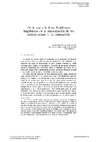Identificador persistente para citar o vincular este elemento:
https://accedacris.ulpgc.es/jspui/handle/10553/3971
| Campo DC | Valor | idioma |
|---|---|---|
| dc.contributor.author | Trapero, Maximiano | en_US |
| dc.contributor.author | Llamas Pombo, Elena | en_US |
| dc.date.accessioned | 2010-06-12T02:31:00Z | - |
| dc.date.accessioned | 2018-03-07T09:25:20Z | - |
| dc.date.available | 2010-06-12T04:01:13Z | - |
| dc.date.available | 2018-03-07T09:25:20Z | - |
| dc.date.issued | 1997 | en_US |
| dc.identifier.issn | 0034-7981 | en_US |
| dc.identifier.other | Scopus | - |
| dc.identifier.other | WoS | - |
| dc.identifier.uri | https://accedacris.ulpgc.es/handle/10553/3971 | - |
| dc.description.abstract | The editor of oral narratives must face certains problems when turning what was originally oral discourse into a written text. The original narrative changes its nature and function as a result of this transformation: the individual word, the performing act, language with a specific social function - playful expressiveness, as well as living and creative preservation of myths, archetypes and tradition - becomes writing, that is, language with no voice, intended for individual reading, and endowed with a different, although no less important, function as a learned and enduring witness to those myths, archetypes and tradition. If writing is a system which attempts to represent language, does the punctuation in the transcription of the oral really represent the narrator's prose, or, on the contrary, is this punctuation exclusively the editor's contribution, narrative thus creating a new written version? In this article, the author examines the punctuation guidelines adopted by different editors of traditional Hispanic ballads - romances in Spanish - in their search for the most faithful rendering of the oral narrative. | en_US |
| dc.format | application/pdf | - |
| dc.language | spa | en_US |
| dc.relation.ispartof | Revista de Dialectologia y Tradiciones Populares | en_US |
| dc.source | Revista De Dialectologia Y Tradiciones Populares [ISSN 0034-7981], v. 52 (1), p. 19-46 | en_US |
| dc.subject | 5701 Lingüística aplicada | en_US |
| dc.title | De la voz a la letra : problemas lingüísticos en la transcripción de los relatos orales. I : la puntuación | en_US |
| dc.title.alternative | From the spoken word to the written word: Linguistic problems in the transcription of oral narratives.1. Punctuation | en_US |
| dc.type | info:eu-repo/semantics/article | en_US |
| dc.type | Article | en_US |
| dc.identifier.scopus | 77952333625 | - |
| dc.identifier.isi | A1997YA84000002 | - |
| dc.contributor.authorscopusid | 38261943000 | - |
| dc.contributor.authorscopusid | 26037799800 | - |
| dc.identifier.absysnet | 168276 | - |
| dc.identifier.crisid | 2710 | - |
| dc.description.lastpage | 46 | en_US |
| dc.identifier.issue | 1 | - |
| dc.description.firstpage | 19 | en_US |
| dc.relation.volume | 52 | en_US |
| dc.investigacion | Artes y Humanidades | - |
| dc.rights.accessrights | info:eu-repo/semantics/openAccess | - |
| dc.type2 | Artículo | en_US |
| dc.contributor.daisngid | 3273065 | - |
| dc.contributor.daisngid | 15564324 | - |
| dc.description.numberofpages | 28 | en_US |
| dc.utils.revision | Sí | - |
| dc.contributor.wosstandard | WOS:Trapero, M | - |
| dc.contributor.wosstandard | WOS:LlamasPombo, E | - |
| dc.date.coverdate | Diciembre 1997 | en_US |
| dc.identifier.supplement | 2710 | - |
| dc.identifier.ulpgc | Sí | es |
| dc.description.sellofecyt | Sello FECYT | |
| dc.description.ahci | AHCI | |
| item.fulltext | Con texto completo | - |
| item.grantfulltext | open | - |
| crisitem.author.dept | GIR Investigaciones Filológicas en Canarias y Nuevas Tecnologías de la Información y la Comunicación | - |
| crisitem.author.dept | Departamento de Filología Hispánica, Clásica y de Estudios Árabes y Orientales | - |
| crisitem.author.parentorg | Departamento de Filología Hispánica, Clásica y de Estudios Árabes y Orientales | - |
| crisitem.author.fullName | Trapero Trapero, Maximiano | - |
| Colección: | Artículos | |
Citas SCOPUSTM
1
actualizado el 08-jun-2025
Citas de WEB OF SCIENCETM
Citations
2
actualizado el 25-feb-2024
Visitas
73
actualizado el 10-ene-2026
Descargas
106
actualizado el 10-ene-2026
Google ScholarTM
Verifica
Comparte
Exporta metadatos
Los elementos en ULPGC accedaCRIS están protegidos por derechos de autor con todos los derechos reservados, a menos que se indique lo contrario.
